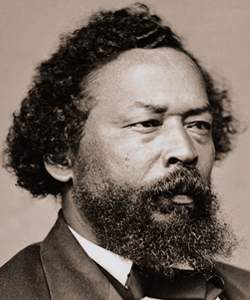Benjamin Sterling Turner (Congressional Biographical Directory)
Reference
TURNER, Benjamin Sterling, a Representative from Alabama; born near Weldon, Halifax County, N.C., March 17, 1825; raised as a slave; received no early education; moved to Alabama in 1830 and by clandestine study obtained a fair education; engaged in mercantile pursuits; elected tax collector of Dallas County in 1867; councilman of the city of Selma in 1869; elected as a Republican to the Forty-second Congress (March 4, 1871-March 3, 1873); unsuccessful candidate for reelection in 1872 to the Forty-third Congress; delegate to the Republican National Convention in 1880; engaged in agricultural pursuits in Alabama; died in Selma, Dallas County, Ala., March 21, 1894; interment in Live Oak Cemetery.
"Turner, Benjamin Sterling," Biographical Directory of the United States Congress, 1774 to Present, http://bioguide.congress.gov/scripts/biodisplay.pl?index=T000414.
Benjamin Sterling Turner (American National Biography)
Scholarship
After the Reconstruction Acts of 1867, Turner was appointed county tax collector with biracial approval. He resigned after a year and, running as an Independent, was elected city councilman. He and another former bondsman were the city's first black city councilmen. When the town began paying them, Turner resigned, because he believed that in such destitute times a city official should serve without compensation. When Conservative Democrats failed to promise voting rights for blacks, Turner helped deliver the town and county in 1868 to the victorious Ulysses S. Grant.
Turner recouped economically to the point that in 1870 he had personal property worth $10,000. He was nominated for Congress in that year with the aid of newly enfranchised blacks and native white Republicans (scalawags). His moderate political philosophy cost him the financial support of the First District's northern-born Republicans (carpetbaggers). Undeterred, the candidate sold a horse to raise campaign funds, and, running on a platform of "Universal Suffrage and Universal Amnesty," he was easily elected. The district had a majority of blacks; in Dallas County alone blacks outnumbered whites 32,152 to 8,522, and he was the first black elected from Alabama to the national House of Representatives.
Turner recouped economically to the point that in 1870 he had personal property worth $10,000. He was nominated for Congress in that year with the aid of newly enfranchised blacks and native white Republicans (scalawags). His moderate political philosophy cost him the financial support of the First District's northern-born Republicans (carpetbaggers). Undeterred, the candidate sold a horse to raise campaign funds, and, running on a platform of "Universal Suffrage and Universal Amnesty," he was easily elected. The district had a majority of blacks; in Dallas County alone blacks outnumbered whites 32,152 to 8,522, and he was the first black elected from Alabama to the national House of Representatives.
William W. Rogers, "Turner, Benjamin Sterling," American National Biography Online, February 2000, http://www.anb.org/articles/04/04-01001.html.



